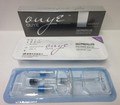Unauthorized injectable drugs and medical devices seized from Revoskin in Vancouver, B.C., may pose serious health risks
- Starting date:
- March 7, 2018
- Posting date:
- March 7, 2018
- Type of communication:
- Advisory
- Subcategory:
- Drugs, Medical Device
- Source of recall:
- Health Canada
- Issue:
- Unauthorized products, Important Safety Information
- Audience:
- General Public
- Identification number:
- RA-66156
Issue
Health Canada is advising Canadians that several unauthorized health products were seized from Revoskin (2299 Burrard Street) in Vancouver, B.C., because they may pose serious health risks.
The seized unauthorized health products were being administered as injectable treatments for cosmetic purposes. They include injectable drugs (botulinum toxin type A in “Nabota” and lidocaine in “Ouye”), and injectable medical devices such as dermal fillers.
Unauthorized health products have not been approved by Health Canada, which means that they have not been assessed for safety, effectiveness and quality. Selling unauthorized health products in Canada is illegal.
Who is affected
- Consumers who have been administered or used any of these unauthorized health products.
Affected products
The unauthorized health products include:
- Crystal Non-Suction Multi Needle for mesotherapy (cosmetic surgery)
- Filorgra M-HA18 (labelled to contain hyaluronic acid)
- Filorgra NCTF 135HA (labelled to contain hyaluronic acid)
- Hyaluronic Acid Na Intra Articular Injection 25 mg Syringe “TEVA” (labelled to contain hyaluronic acid)
- Juvederm Ultra 2 (labelled to contain hyaluronic acid)
- Juvederm Ultra 3 (labelled to contain hyaluronic acid)
- Mesotox Brightening Solution
- Mesotox Firming Solution
- Nabota (labelled to contain botulinum toxin type A)
- Ouye (labelled to contain lidocaine)
- Regenlab Activation Solution
- Rejuran (intradermal injection or cannula injection)
- Rejuran i (intradermal injection or cannula injection)
What consumers should do
- Do not use these unauthorized products from Revoskin or from other locations. Consult with your health care professional if you have used or have been administered any of these products and have health concerns.
- Read product labels to verify that health products have been authorized for sale by Health Canada. Authorized health products have an eight-digit Drug Identification Number (DIN), Natural Product Number (NPN) or Homeopathic Drug Number (DIN-HM). You can also check whether products have been authorized for sale by searching Health Canada's Drug Product Database and Licensed Natural Health Product Database or the Medical Devices Active Licence Listing Database.
- Report adverse events to health products to Health Canada by calling toll-free at 1-866-234-2345, or by reporting online, by mail or by fax.
- Report complaints about health products to Health Canada by calling toll-free at 1-800-267-9675, or complete an online complaint form.
What Health Canada is doing
Health Canada seized the unauthorized health products and is working with the Canada Border Services Agency to help prevent further importation of these products. Should additional retailers or distributors be identified, Health Canada will take appropriate action and inform Canadians as necessary.
Background
Botulinum toxin type A is used to treat severe muscle spasms in the neck, eye and foot, as well as chronic migraines, urinary incontinence, and excessive sweating. It is also used for cosmetic purposes to treat facial wrinkling. Authorized botulinum toxin type A products should only be used under specialist supervision and only if the benefits of treatment are considered to outweigh the risks. Potential risks associated with injecting an unauthorized Botulinum toxin type A product can range from mild local paralysis to death. All products administered by injection in Canada must be authorized for sale by Health Canada.
Lidocaine injection can only be used by a health care professional in a hospital or clinic adequately equipped to manage side effects. Too much of it may cause toxic effects such as seizures, fainting, shortness of breath, or even death in severe cases. These side effects can also happen when a small amount of lidocaine is injected in a sensitive spot.
The use of unlicensed medical devices (such as hyaluronic acid) carries significant risk due to potential for infection, scarring and poor outcomes. These devices have not been assessed for safety, effectiveness or quality.
Media enquiries
Stay connected with Health Canada and receive the latest advisories and product recalls.
Health Canada
(613) 957-2983
Public enquiries
(613) 957-2991
1-866 225-0709
Images
Select thumbnail to enlarge - opens in a new window












